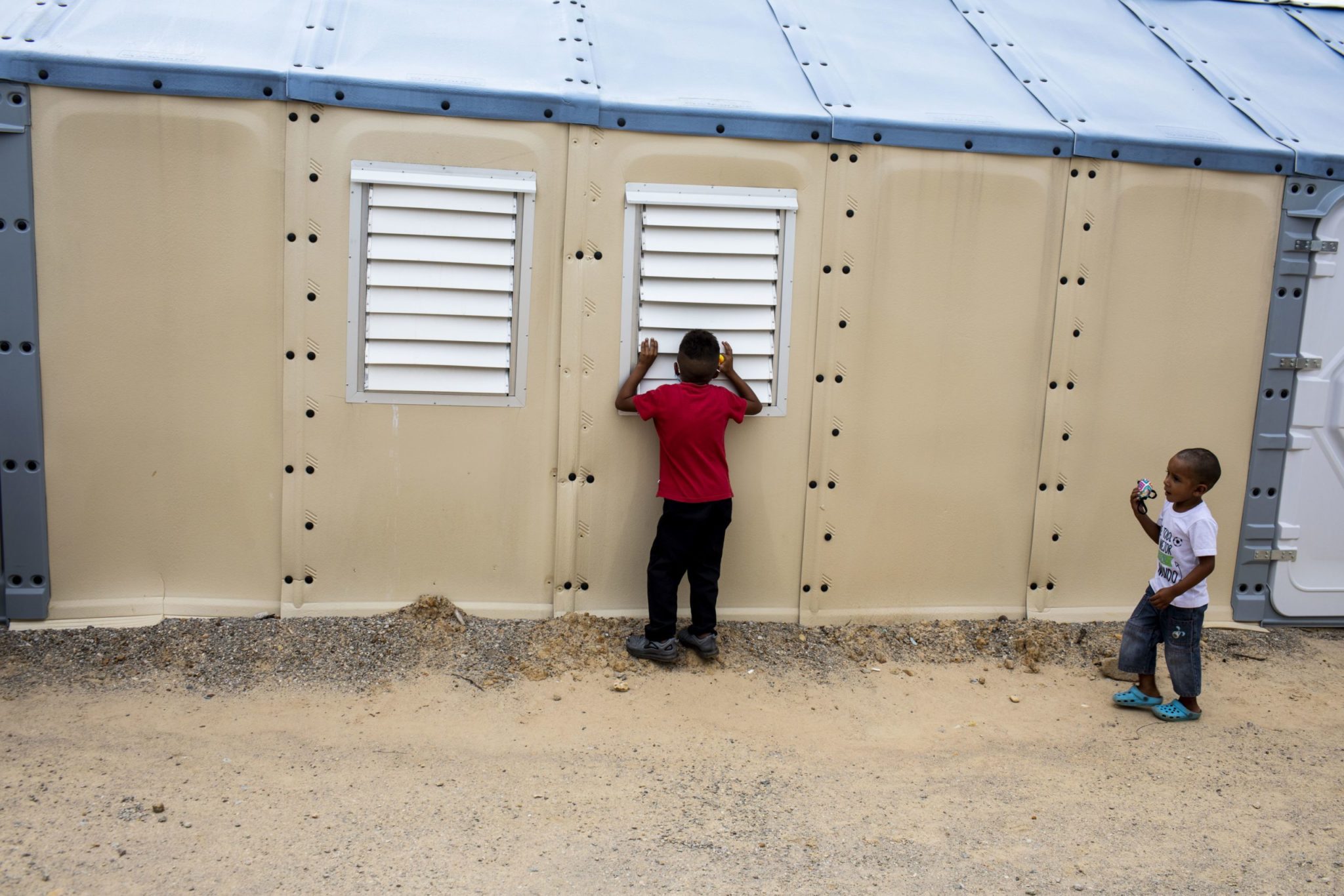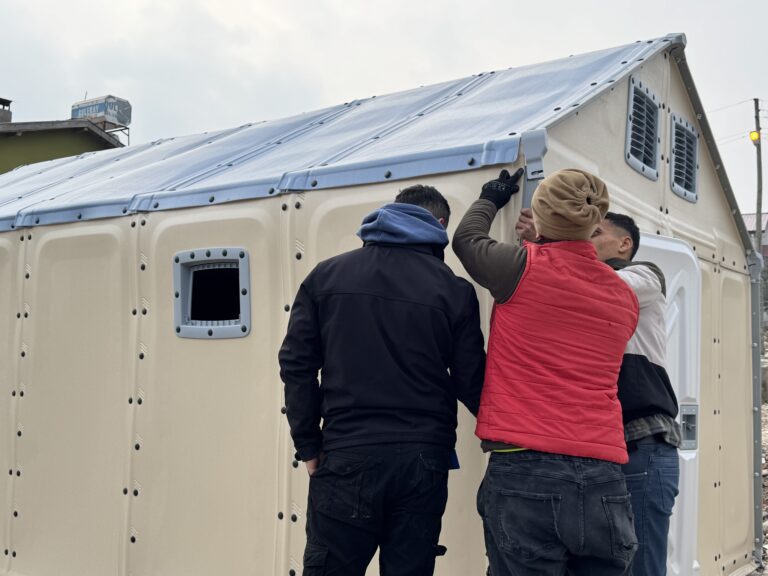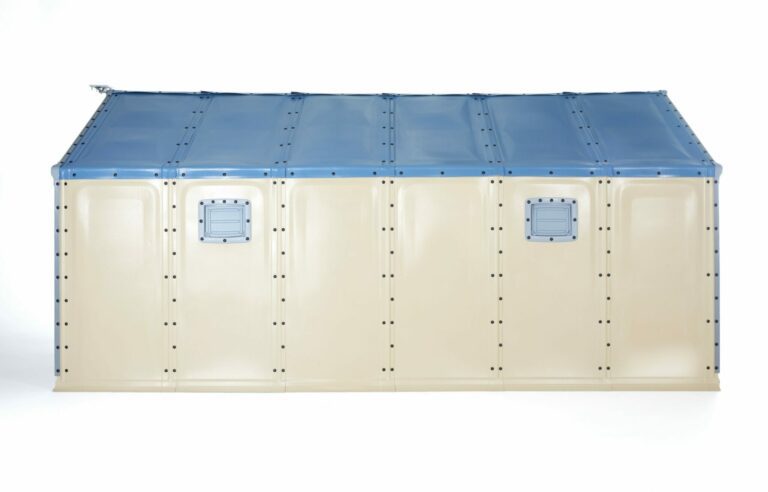Supporting critical services to improve livelihoods of Venezuelan refugees in Colombia

It is estimated that 1.7 million out of the more than 5.5 million refugees and migrants from Venezuela are currently residing in Colombia. In response to the migration of Venezuelans into Colombia and neighbouring countries, UNHCR established an Integrated Assistance Centre in Maicao, Colombia.
The Integrated Assistance Centre opened in Maicao in March 2019 to provide short term shelter for hundreds of people, in addition to food, health services, legal advice, counselling and family reunification. The centre has the capacity for 1,400 people, where refugees and migrants can live in a Better Shelter Relief Housing Unit (RHU) for one month. Prioritisation is given to the most vulnerable refugees, migrants, Colombian returnees and the indigenous Wayuú population.
Read more about UNHCR’s efforts in Colombia here.
Refugee Housing Units (RHUs) at the Integrated Assistance Centre in Maicao, northern Colombia. ; Maicao in northern Colombia has one of the highest populations of Venezuelan refugees and migrants in the region and La Guajira ranks highest on the country’s basic needs index. The Integrated Assistance Centre opened in Maicao in March 2019 to provide short term shelter for hundreds of people as well as food, health services, legal orientation, counselling and family reunifications. Beneficiaries can stay for up to one month and prioritisation is given to the most vulnerable refugees, migrants, Colombian returnees and the indigenous Wayuú population.
Venezuelan refugee, Bryan Jose Petit Guerra, 14, sits in a Refugee Housing Unit (RHU), at the Integrated Assistance Centre in Maicao, northern Colombia. ; Maicao in northern Colombia has one of the highest populations of Venezuelan refugees and migrants in the region and La Guajira ranks highest on the country’s basic needs index. The Integrated Assistance Centre opened in Maicao in March 2019 to provide short term shelter for hundreds of people as well as food, health services, legal orientation, counselling and family reunifications. Beneficiaries can stay for up to one month and prioritisation is given to the most vulnerable refugees, migrants, Colombian returnees and the indigenous Wayuú population.
Venezuelan refugee children play outside a Refugee Housing Unit (RHU) at the Integrated Assistance Centre in Maicao, northern Colombia. ; Maicao in northern Colombia has one of the highest populations of Venezuelan refugees and migrants in the region and La Guajira ranks highest on the country’s basic needs index. The Integrated Assistance Centre opened in Maicao in March 2019 to provide short term shelter for hundreds of people as well as food, health services, legal orientation, counselling and family reunifications. Beneficiaries can stay for up to one month and prioritisation is given to the most vulnerable refugees, migrants, Colombian returnees and the indigenous Wayuú population.
Refugee Housing Units (RHUs) at the Integrated Assistance Centre in Maicao, northern Colombia. ; Maicao in northern Colombia has one of the highest populations of Venezuelan refugees and migrants in the region and La Guajira ranks highest on the country’s basic needs index. The Integrated Assistance Centre opened in Maicao in March 2019 to provide short term shelter for hundreds of people as well as food, health services, legal orientation, counselling and family reunifications. Beneficiaries can stay for up to one month and prioritisation is given to the most vulnerable refugees, migrants, Colombian returnees and the indigenous Wayuú population.
Refugee Housing Units (RHUs) at the Integrated Assistance Centre in Maicao, northern Colombia. ; Maicao in northern Colombia has one of the highest populations of Venezuelan refugees and migrants in the region and La Guajira ranks highest on the country’s basic needs index. The Integrated Assistance Centre opened in Maicao in March 2019 to provide short term shelter for hundreds of people as well as food, health services, legal orientation, counselling and family reunifications. Beneficiaries can stay for up to one month and prioritisation is given to the most vulnerable refugees, migrants, Colombian returnees and the indigenous Wayuú population.



